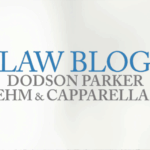Tennessee Supreme Court Rules Preemption Rule Not Compatible with Comparative Fault
The “preemption rule,” which has been adopted in a number of jurisdictions around the country, limits injured plaintiffs’ ability to prove wrongdoing against employers because, so long as an employer admits that it is vicariously liable for an employee’s negligence, the employer’s own potential acts of misconduct for negligent supervision, hiring, training, or entrustment are not disclosed to the trier-of-fact.
The Tennessee Supreme Court ruled in favor of the Plaintiff/Appellee, Melissa Binns, in the case of Melissa Binns v. Trader Joe’s East, Inc., M2022-01033-SC-R11-CV (Tenn. April 8, 2024), stating, “We hold that the preemption rule is incompatible with Tennessee’s system of comparative fault and decline to adopt it.” In a unanimous decision, the Court held that:
-
- an employer can be held both directly liable for its own negligent conduct as well as vicariously liable for the negligent conduct of its employees (declining to adopt the preemption rule); and
- a plaintiff may pursue direct negligence claims against an employer concurrently with a premises liability theory.
The Binns ruling means that plaintiffs can simultaneously pursue claims against an employer for both its own direct negligence and its vicarious liability for an employee’s negligence. This ruling is a significant development in Tennessee, protecting rights of Plaintiffs to hold employers accountable for their actions or inactions that lead to a person’s injuries.
Representing Appellee Melissa Binns in this case were Donald Capparella, as lead appellate counsel, assisted by Tyler Chance Yarbro and Jacob A. Vanzin, from Dodson, Parker, Behm, and Capparella P.C., as well as John L. Griffith and Jonathan D. Lawrence of Griffith Law.
You can view the oral argument video here or read the Opinion here.
No Liability for Fall on Defective Sidewalk
This is a good example of why lawyers need to develop (and use!) checklists for trial. When you file suit after a fall on a defective sidewalk, you need to be sure you can elicit testimony not just that the sidewalk was defective but that it caused the fall…
Court of Appeals Provides Guidance on Statutory Summary Judgment Standard
The Tennessee Supreme Court’s 2015 decision in Rye v. Women’s Care Ctr. of Memphis, MPLLC, 477 S.W.3d 235 (Tenn. 2015) established that Tennessee generally follows the federal standard where summary judgment motions are concerned, but left many open questions–particularly regarding the interplay between the Rye decision and the pre-existing Tennessee statutory summary judgment standard. (See our write-ups here and here.) But, the Court of Appeals has recently provided some help for practitioners… read more
Dance Party Results in Injuries But No Liability
The Court of Appeals recently examined potential liability from a deck collapse during a party attended by “a ridiculous amount” of high school students. The upshot? It seems like a determination that having lots of people jumping and dancing on a deck doesn’t make it forseeable that the deck could break and hurt people… read more
Premises Liability Case Falls Short
Premises liability cases are often difficult, and the recent case of Mooney v. Genuine Parts Company d/b/a National Automotive Assoc. illustrates read more
Court of Appeals Opinion Gives Guidance on Slip and Fall Cases
The recent Tennessee Court of Appeals opinion in Brown v. Mercer-Defriese provides an excellent outline for proof to be presented in a premises liability action involving allegations of an unreasonably dangerous step.
Nancy Brown, was at a rental property owned by Nancy Mercer-Defriese and Spencer Defriese, viewing the property as a prospective tenant. She tripped over a three-inch “step” or “threshold,” and as a result suffered serious injuries including a broken hip and femur. She then filed a premises liability action, alleging that the step was an unreasonably dangerous and defective condition that caused her to fall.
A jury trial occurred. Plaintiff presented her own testimony and the testimony of a professional engineer, Clarkson Lee Mason. In addition to their own testimony, Defendants presented the testimony of Tim Dodd, a professional engineer, and Dallas Y. Rucker, the building official for the City of Chattanooga.
At the close of the proof, Defendants moved for a directed verdict, which the trial court granted. The trial court found that it was not reasonably foreseeable under the circumstances that Plaintiff would trip over the step and further found that the condition of the step was open and obvious and should have been seen by Plaintiff. Lastly, the trial court found that there was no duty to warn the Plaintiff of the condition of the step. Ms. Brown appealed.
Ruling:
The sole issue on appeal was whether the trial court erred in granting a directed verdict for the Defendants. The Court characterized the “fundamental” issue as whether Plaintiff presented sufficient evidence from which a juror could reasonably find that the step was unreasonably dangerous or defective. The Court held that Plaintiff did submit such evidence. read more




